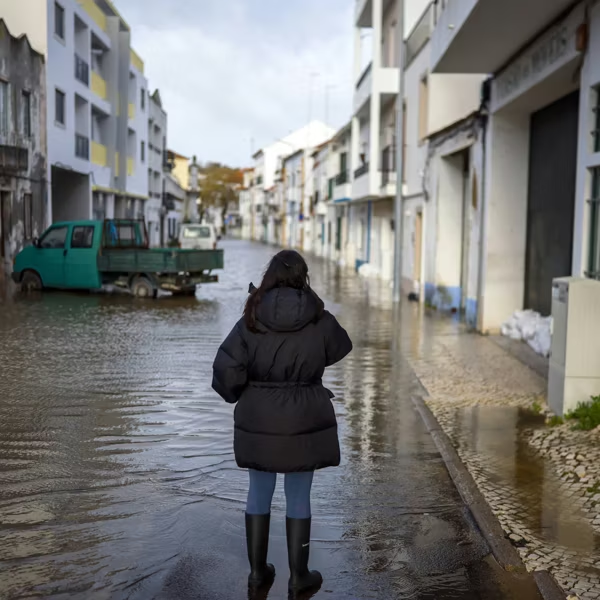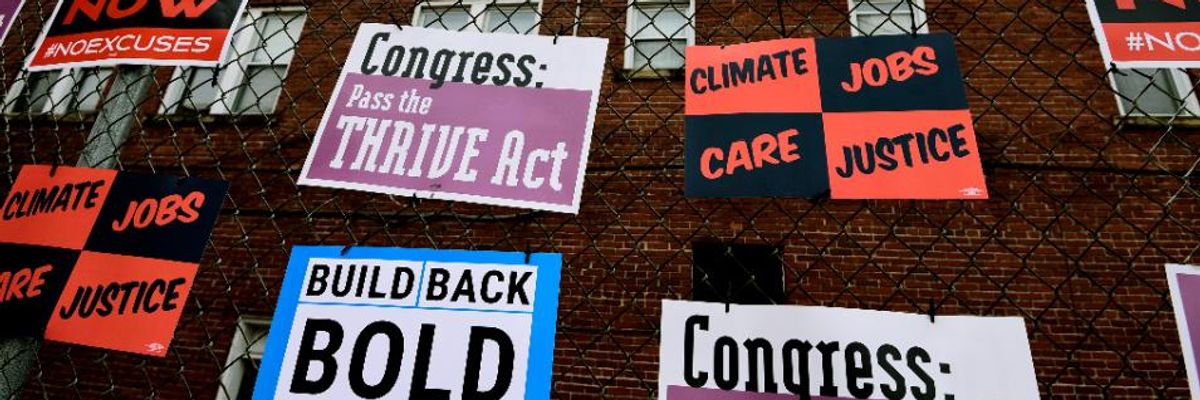Pointing to the nation's tepid recovery from the 2009 financial collapse as a cautionary tale, economists are pressing Democratic lawmakers to dramatically expand President Joe Biden's $2.3 trillion infrastructure proposal in order to equitably rebound from the coronavirus crisis, achieve full employment, and combat the existential climate emergency.
In a 38-page report (pdf) released Thursday, Dr. Adam Hersh of the University of Massachusetts Amherst and Dr. Mark Paul of the New College of Florida argue that the costs of allowing the economy to run "too cold" by under-spending on pressing needs far outweigh the risks of inflation and other potential consequences of overshooting.
"We agree that it's time for transformative change. We look forward to working with the Biden administration to expand on their proposal and ensure that the American Jobs Plan goes big."
--Rep. Pramila Jayapal
Urging Congress to consider around $10 trillion in spending on core infrastructure, caregiving, and green energy to "rebuild" the nation over the next decade, Hersh and Paul write that "worries about economic 'overheating'... have for too long prompted policymakers to run the economy too cold, creating a self-reinforcing 'doom loop' of diminished expectations and underachievement."
"With economic recovery riding on unprecedented stimulus efforts and new unemployment claims still outpacing the worst period of the Great Recession, returning the nation to its full economic health and potential will take a lot more effort," the pair argues. "Simply returning the economy to its pre-pandemic status quo is not enough."
On top of the long-term economic damage that could result from under-spending in the near future, Hersh and Paul warn that failure to adequately invest in transitioning the U.S. energy system away from fossil fuels risks "disasters far more severe than the Covid-19 pandemic."
"These outcomes can be averted if policymakers act now and act boldly. Fortunately, responding to the climate crisis presents more opportunity than cost," the report reads. "Green investments, often wrongly portrayed as at odds with growth, are actually some of the most potent economic policies Congress can consider."
To avoid the mistakes of 2009--when Democratic lawmakers prolonged the crisis by settling for a stimulus that was far too austere--Hersh and Paul call on Congress to "run the economy 'hot,' investing big to achieve true full employment, redress chronic racial and gender inequalities, and avert a looming climate catastrophe."
"The costs of inaction outweigh the risks of borrowing to take action--by trillions of dollars," the economists write, estimating that inadequate fiscal policy in the wake of the 2009 crash cost the U.S. economy at least $8.2 trillion in GDP combined from 2010 to 2019, amounting to $32,317 in lost income per adult.
"Going too small on spending in past recoveries did more than make the economy more unequal--it created a self-reinforcing cycle of economic underperformance that permanently reduced America's potential for growth and prosperity," Hersh and Paul note.
The new report came as the nearly 100-member Congressional Progressive Caucus (CPC) outlined its priorities for the American Jobs Plan, which Democratic leaders hope to pass by July.
According to a document (pdf) obtained by Politico on Friday, the CPC is pushing Congress to:
- Invest $450 billion in Medicaid home and community-based services;
- Make access to childcare a universal benefit;
- Establish permanent paid family and medical leave;
- [Spend] $70 billion to address the public housing repair backlog;
- Make weatherization and energy efficiency upgrades consistent with the Green New Deal for Public Housing;
- Cap drug prices at the average price in other OECD countries;
- Use savings to pay for lowering Medicare eligibility age and expanding benefits to include dental, vision and hearing;
- Create millions of clean jobs in the renewable energy sector to help meet emissions reductions through binding, enforceable federal clean-energy standards;
- Establish or enhance public employment programs to directly put Americans to work serving the public interest, including the robust funding of a Civilian Climate Corps, Public Health Jobs Corps, and Resilience Job Corps; and
- Provide a roadmap to citizenship for essential workers, TPS recipients, and Dreamers.
"We agree that it's time for transformative change," Rep. Pramila Jayapal (D-Wash.), chair of the CPC, said in a statement. "We look forward to working with the Biden administration to expand on their proposal and ensure that the American Jobs Plan goes big to truly meet the needs of the public."




